冀教版五年级英语下学期全册复习资料
冀教版小学五年级英语第二学期复习资料
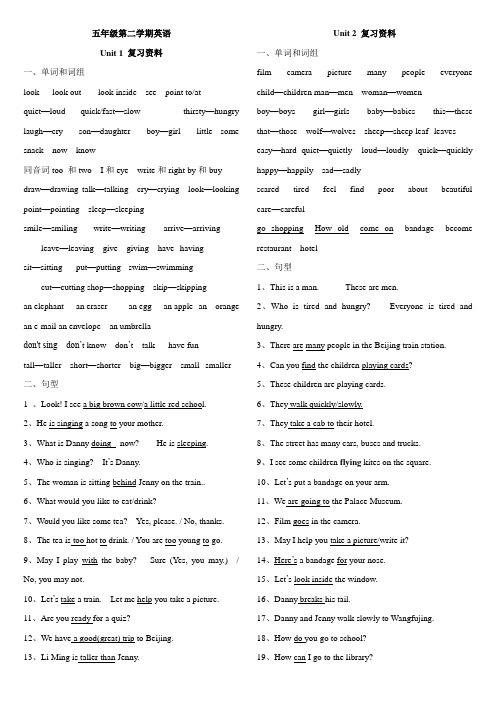
五年级第二学期英语Unit 1 复习资料一、单词和词组look look out look inside see point to/at quiet—loud quick/fast—slow thirsty—hungry laugh—cry son—daughter boy—girl little some snack now know同音词too 和two I和eye write和right by和buy draw—drawing talk—talking cry—crying look—looking point—pointing sleep—sleepingsmile—smiling write—writing arrive—arriving leave—leaving give---giving have--having sit—sitting put—putting swim—swimmingcut—cutting shop—shopping skip—skippingan elephant an eraser an egg an apple an orange an e-mail an envelope an umbrelladon't sing don’t know don’t talk have fun tall—taller short—shorter big—bigger small--smaller二、句型1 、Look! I see a big brown cow/a little red school.2、He is singing a song to your mother.3、What is Danny doing now? He is sleeping.4、Who is singing? It’s Danny.5、The woman is sitting behind Jenny on the train..6、What would you like to eat/drink?7、Would you like some tea? Y es, please. / No, thanks.8、The tea is too hot to drink. / Y ou are too young to go.9、May I play with the baby? Sure (Y es, you may.) / No, you may not.10、Let’s take a train. Let me help you take a picture.11、Are you ready for a quiz?12、We have a good(great) trip to Beijing.13、Li Ming is taller than Jenny.Unit 2 复习资料一、单词和词组film camera picture many people everyone child—children man—men woman—womenboy—boys girl—girls baby—babies this—these that—those wolf—wolves sheep—sheep leaf--leaves easy—hard quiet—quietly loud—loudly quick—quickly happy—happily sad—sadlyscared tired feel find poor about beautiful care—carefulgo shopping How old come on bandage become restaurant hotel二、句型1、This is a man. These are men.2、Who is tired and hungry? Everyone is tired and hungry.3、There are many people in the Beijing train station.4、Can you find the children playing cards?5、These children are playing cards.6、They walk quickly/slowly.7、They take a cab to their hotel.8、The street has many cars, buses and trucks.9、I see some children flying kites on the square.10、Let’s put a bandage on your arm.11、We are going to the Palace Museum.12、Film goes in the camera.13、May I help you take a picture/write it?14、Here’s a bandage for your nose.15、Let’s look inside the window.16、Danny breaks his tail.17、Danny and Jenny walk slowly to Wangfujing.18、How do you go to school?19、How can I go to the library?Unit 3 复习资料一、单词和词组some postcard letter e-mail stamp envelope computer paper picture hall shop hotel ticket address buy write send top bottom left right corneron the left on the right in the corner in the top, right corner a picture of send my father an e-mailwrite a letter to my mother different the same二、句型1、I want to buy some postcards.2、A postcard has a picture on it.3、It has a picture of the Palace Museum.4、The panda is drinking tea.5、It’s funny.6、How much for this envelope? I’ll take nine, please.7、I want to send this postcard to my brother.8、This is the top(bottom left right) of the envelope.9、Where do you write on the postcard?10、Where do you put the address / stamp on the postcard?11、Write the day first.12、I’m writing a letter to my friend.13、Can you point to the bottom of the envelope?14、Li Ming needs a stamp for his letter.15、I can buy stamps at the post office.16、Do you know where the post office is?17、Where are you sending your letter?18、Do you need stamps?19、Y ou live with your mother.20、Y our address and her address are the same.21、Is my address 942 Ninth A venue?22、I have a friend in Canada.23、Does the hotel have a computer?24、Let’s see if the hotel has a computer. 25、I am coming home to Canada on February sixth.Unit 4 复习资料一、单词和词组want—wanted help—helped play—played jump—jumped look—looked talk—talked walk—walked miss—missedshop—shoppedlike—liked live—lived cry—cried study—studied go—went see—saw eat—ate is/am—was are—were do—did have—had happen—happened hurt—hurt write—wrote fall—fell break—broke buy—bought come—came sit—sat drink--drankgive—gave swim—swam say—said leave—left run—ran feel—felt sleep—slept get—got二、句型1、What did you do yesterday? I went to a restaurant yesterday.2、Did you have fun yesterday? Y es, I did. / No, I didn’t.3、We saw people flying kites.4、I have/buy a gift for you.5、I was taking a picture with Jenny’s camera.6、Danny and I have some pictures from our trip to Beijing.7、This is Jenny and me at our hotel. / on the train.8、How did you go to Tian’anmen Square? By bus.9、It’s too small/big for me, but it’s just right for you.10、Do you like it? Yes, I do. It’s wonderful.11、It’s a letter from Ling Ming.12、Show your green card for the right answer and your red card for the wrong answer.13、I liked going to Wangfujing to buy gifts.14、Let’s put it above the desk.15、I talked to many store clerks.。
冀教版(三起)五年级英语下册全册知识点汇总

冀教版(三起)五年级英语下册全册知识点汇总Unit: XXX BeijingCore Vocabulary:1.n-related words:Jump。
run。
dance。
sing。
sit。
stand。
look。
see。
draw。
cry。
sleep。
talk.2.Food-related words:XXX。
water。
candy.3.ns of n:Down。
up.4.Personal nouns:Man。
woman。
baby。
boy。
girl.5.XXX:Now。
who。
picture。
hungry。
sorry.6.XXX:Look at。
look out of.XXX Vocabulary:1.Other food-related words:Noodles。
dumplings。
hamburger。
bread.2.Other common adverbs of time:XXX。
XXX.Core Sentence Structures:1.Please don't run!Meaning: This is a negative imperative sentence。
which means not to do something.XXX: Please don't open the window。
It's cold outside.2.I want to sing!XXX: This is a sentence structure used to express someone's desire to do something.XXX: XXX go swimming.3.- Jenny。
what are you doing now?I am drawing a picture.XXX: This is a sentence structure used to ask what someone is doing at the moment.XXX: What is Amy doing。
冀教版五年级英语下册知识点2024
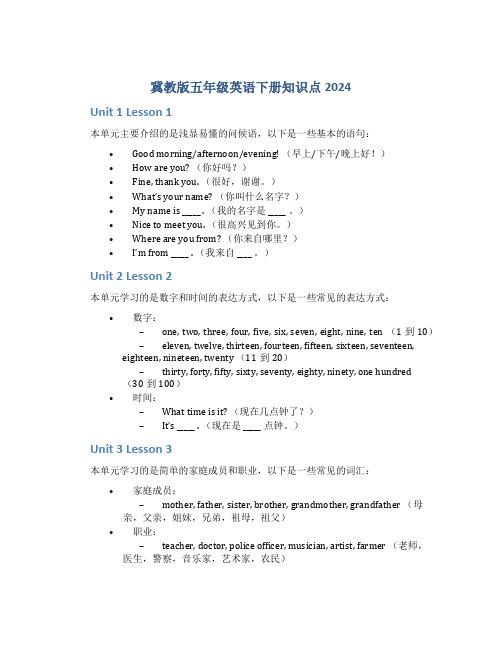
冀教版五年级英语下册知识点2024Unit 1 Lesson 1本单元主要介绍的是浅显易懂的问候语,以下是一些基本的语句:•Good morning/afternoon/evening! (早上/下午/晚上好!)•How are you? (你好吗?)•Fine, thank you. (很好,谢谢。
)•What’s your name? (你叫什么名字?)•My name is _____ . (我的名字是 _____ 。
)•Nice to meet you. (很高兴见到你。
)•Where are you from? (你来自哪里?)•I’m from _____ . (我来自 ____ 。
)Unit 2 Lesson 2本单元学习的是数字和时间的表达方式,以下是一些常见的表达方式:•数字:–one, two, three, four, five, six, seven, eight, nine, ten (1到10)–eleven, twelve, thirteen, fourteen, fifteen, sixteen, seventeen, eighteen, nineteen, twenty (11到20)–thirty, forty, fifty, sixty, seventy, eighty, ninety, one hundred (30到100)•时间:–What time is it? (现在几点钟了?)–It’s _____ . (现在是 _____ 点钟。
)Unit 3 Lesson 3本单元学习的是简单的家庭成员和职业,以下是一些常见的词汇:•家庭成员:–mother, father, sister, brother, grandmother, grandfather (母亲,父亲,姐妹,兄弟,祖母,祖父)•职业:–teacher, doctor, police officer, musician, artist, farmer (老师,医生,警察,音乐家,艺术家,农民)Unit 4 Lesson 4本单元学习的是简单的交通工具和指示方向的用语,以下是一些常见的词汇:•交通工具:–car, boat, bus, bike, train, plane (汽车,船,公共汽车,自行车,火车,飞机)•指示方向:–Go straight. (直走。
冀教版五年级英语下册复习重点
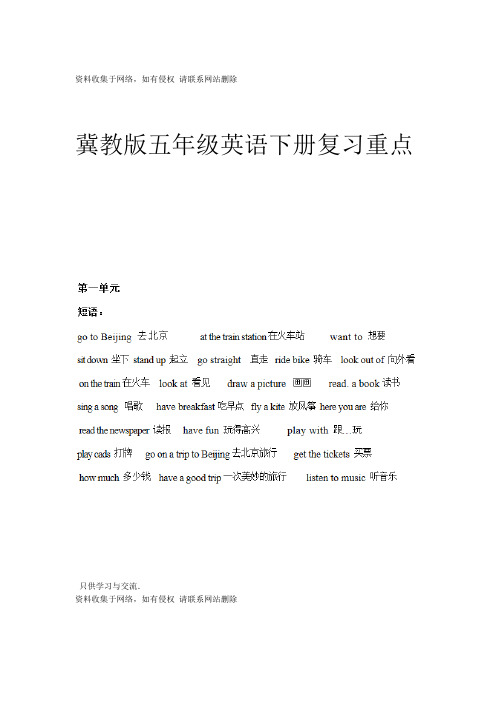
资料收集于网络,如有侵权请联系网站删除
冀教版五年级英语下册复习重点
只供学习与交流.
资料收集于网络,如有侵权请联系网站删除
只供学习与交流.
资料收集于网络,如有侵权请联系网站删除
只供学习与交流.
资料收集于网络,如有侵权请联系网站删除
只供学习与交流.
资料收集于网络,如有侵权请联系网站删除
只供学习与交流.
资料收集于网络,如有侵权请联系网站删除
只供学习与交流.
资料收集于网络,如有侵权请联系网站删除
只供学习与交流.。
冀教版五年级下册英语全册复习资料
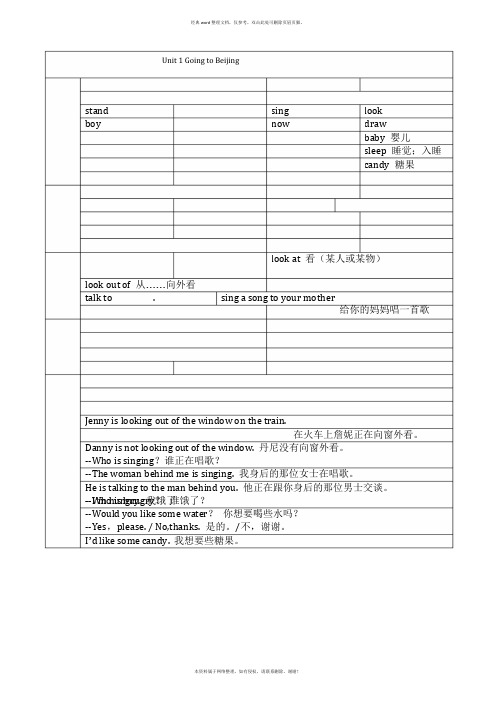
Unit 1 Going to Beijingstand boy singnowlookdrawbaby 婴儿sleep 睡觉;入睡candy 糖果look at 看(某人或某物)look out of 从……向外看talk to . sing a song to your mother给你的妈妈唱一首歌Jenny is looking out of the window on the train.在火车上詹妮正在向窗外看。
Danny is not looking out of the window. 丹尼没有向窗外看。
--Who is singing?谁正在唱歌?--The woman behind me is singing. 我身后的那位女士在唱歌。
He is talking to the man behind you. 他正在跟你身后的那位男士交谈。
--Who is hungry?谁饿了?--I’m hungry. 我饿了--Would you like some water?你想要喝些水吗?--Yes,please. / No,thanks. 是的。
/不,谢谢。
I’d like some candy. 我想要些糖果。
people 人们busy 忙碌的many 许多的;许child 孩子(复数形式为children)多women 女人(woman 的复数形式)take乘坐;买下;拍照be 是;存在(am,is,are 等的原形动词)feel 觉得;感到tired 疲劳的;累的stop 停下,停止(公共汽车、火车)站afraid 害怕,畏惧for 为……,给……difficult 困难的football 足球Well 健康,噢take a picture 拍照be afraid 害怕far from…离…远take a bus 乘公交车stand beside Jenny 站在詹妮旁边so busy 如此忙碌how old 多大,多少年more than... 超过......do Tai Chi 打太极don’t worry 别担心The Palace Museum 故宫They are on their way to the hotel. 他们在去宾馆的路上。
冀教版五年级下册英语总复习资料

冀教版五年级下册英语总复习资料Unit 1 Let’s go camping.Words and Phrases•camp: 露营•tent: 帐篷•sleeping bag: 睡袋•flashlight: 手电筒•match: 火柴•bonfire: 篝火•roast marshmallows: 烤棉花糖•sing songs: 唱歌Grammar•一般现在时:行为动词的第三人称单数用“-s”或“-es”。
•引导词“let’s”,意为“让我们”,构成祈使句。
Sentence Patterns1.Let’s go camping. 我们去露营吧。
2.We set up the tent. 我们搭帐篷。
3.We build a big bonfire. 我们生了个大篝火。
4.We roast marshmallows. 我们烤棉花糖。
Unit 2 What’s the matter?Words and Phrases•ouch: 哎哟•ache: 疼痛•headache: 头疼•stomachache: 肚子疼•fever: 发烧•cough: 咳嗽•sneeze: 喷嚏•sore throat: 嗓子疼Grammar•一般现在时:表状态的非行为动词。
•现在进行时:表示现在正在进行的动作。
Sentence Patterns1.What’s the matter? 怎么了?2.I have a headache. 我头疼。
3.She has a stomachache. 她肚子疼。
4.He has a fever. 他发烧。
5.They are coughing. 他们在咳嗽。
Unit 3 How old are you?Words and Phrases•old: 年龄•year: 年•age: 年龄•celebrate: 庆祝•party: 派对•cake: 蛋糕•present: 礼物•balloon: 气球Grammar•be动词的一般现在时。
小学英语英语五年级下学期(冀教版)全册知识点归纳

Unit1 Going to Beijing一、词汇(千里之行,始于单词哦!)run 跑 sorry 对不起 sing 唱,唱歌dance 跳,跳舞 sit 坐down 向下,朝下,沿着stand 站立,直立 up 向上,在上面see 看见,明白,会见 look 看,瞧look out of 从……向外看 look at 看boy 男孩 girl 女孩 now 现在 draw 画picture 图片,照片woman 女人baby 婴儿 cry 哭,哭泣,喊叫talk 交谈,讨论man 男人sleep 睡觉,入睡who 谁 hungry 饥饿的 water 水tea 茶candy 糖果二、句型(学会了这些句子,会变得更加优秀哦!)1. Please don’t run/jump/sing/dance! 请不要跑/跳/唱歌/跳舞!2. Please sit down./Please stand up. 请坐下。
/请站起来。
3. Jenny is looking out of the window>詹妮正在火车上向窗外看。
4. Some boys and girls are playing there.一些男孩和女孩正在那里玩。
5. I see a banana! /I see dumplings!我看到一个香蕉。
/我看到饺子!6. A: Are you singing, Jenny? 你在唱歌吗,詹妮?B: No, I’m not. 不,我没有。
7. A:Who is talking? 谁在说话?B: Danny is talking. 詹妮正在说话。
8. The baby is sleeping now. 婴儿在睡觉。
9. A: Who is hungry? 谁饿了?B: I’m hungry! 我饿了!10. A: Would you like some fruit? 你想要一些水果吗?B: Yes, please. I’d like an apple and an orange, Mrs. Li.是的。
冀教版五年级下册复习资料
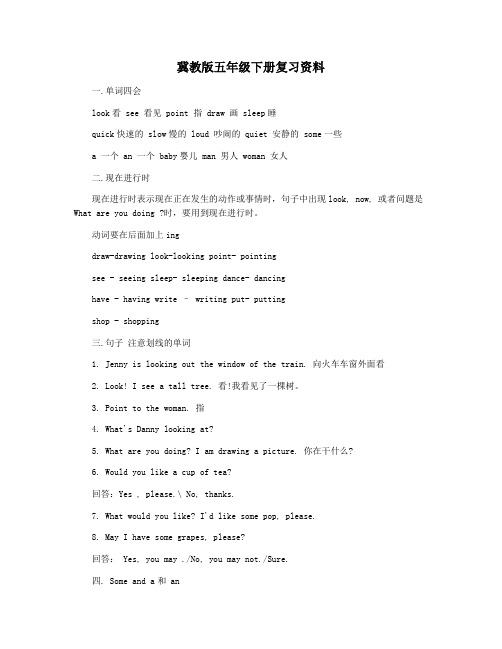
冀教版五年级下册复习资料一.单词四会look看 see 看见 point 指 draw 画 sleep睡quick快速的 slow慢的 loud 吵闹的 quiet 安静的 some一些a 一个 an 一个 baby婴儿 man 男人 woman 女人二.现在进行时现在进行时表示现在正在发生的动作或事情时,句子中出现look, now, 或者问题是What are you doing ?时,要用到现在进行时。
动词要在后面加上ingdraw-drawing look-looking point- pointingsee - seeing sleep- sleeping dance- dancinghave - having write – writing put- puttingshop - shopping三.句子注意划线的单词1. Jenny is looking out the window of the train. 向火车车窗外面看2. Look! I see a tall tree. 看!我看见了一棵树。
3. Point to the woman. 指4. What's Danny looking at?5. What are you doing? I am drawing a picture. 你在干什么?6. Would you like a cup of tea?回答:Yes , please.\ No, thanks.7. What would you like? I'd like some pop, please.8. May I have some grapes, please?回答: Yes, you may ./No, you may not./Sure.四. Some and a和 anSome and a和 an,使用时候要分清;一般单数要用a,苹果橘子鸡蛋冰淇淋,an an 是例外;两个以上或不可数,some some不要忘。
冀教版小学英语五年级下册知识点总结(期末复习)

Unitl Going to Beijing一、知识目标:run跑sorry对不起jump跳sing唱sit坐down 向下stand站up向上see看见look看boy男孩girl女孩now现在draw画picture图画woman女人baby儿cry哭talk谈话man男人sleep睡觉who谁hungry饥饿的water水tea茶candy糖果单词:Mrs.女士Mr.先生宾语)okay好的some—些there 那里song歌ask询问card卡片find发现them他们(宾语)then然后good-bye拜拜or或者短语:1、arrive at+小地方到达arrive in+大地方到达...(提示:arrive后面不跟地点时,无需加介词)2、the train station火车站3、run to...跑向..walk to...走向..(提示:要想表达跑向或走向某地,动词后面一定要加介词to;但若其后接的是地点副词home、here、there等时,则不加to)4、sit down坐卜stand up站起来5,on the train在火车上on the bus在公交车上6x look out of...从..向外看(区别:look out向外看,小心)look at...看…7、Sing a song to sb.给某人唱歌(表示给某人唱歌,后面要加to)8、the woman behind me在我后而的那个女人the woman behind me在我后面的那个男人9、talk to...和......谈话10、read the newspaper读报纸read a book读书11、play cards(with sb.)(和某人)玩牌play chess(with sb.)(和某人)下棋12、have fun玩得高兴have a good time玩得开心13、go on a trip=go on a jouruey去旅彳亍14、say good-bye说再见15、look for寻找look at…看..句子与句型:1、Please don;t run!请不要跑!2、I want to jump!我想跳!3、What do they see on the train?他们在火车看见了什么?句型:what+do/does+主语+see+地点词组?用来询问某人在某处看见了什么?答语:主语+see/sees+名词(+地点词组).4、Some boys and girls are playing there.一些男孩和一些女孩正在那里玩要。
(完整版)小学英语冀教版五年级下册综合知识点汇总,推荐文档
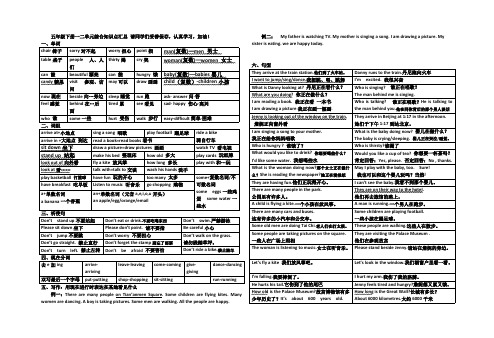
五年级下册一二单元综合知识点汇总请同学们妥善保存,认真学习,加油!一、单词chair椅子sorry对不起worry担心point指man(复数)—men 男士table桌子people 人、人们thirty渴cry哭woman(复数)—women 女士can 能beautiful漂亮can 能hungry 饿baby(复数)—babies婴儿candy糖果visit 参观、访问may可以draw画画child(复数)-children小孩now现在beside向…旁边sleep睡觉run跑ask- answer问-答feel感觉behind在…后面tired累see看见sad- happy 伤心-高兴who 谁some一些hurt 受伤walk 步行easy-difficult简单-困难二、词组arrive at+小地点sing a song 唱歌play football 踢足球arrive in +大地点到达read a book=read books看书ride a bike 骑自行车sit down坐下draw a picture=draw pictures 画画watch TV 看电视stand up 站起make his bed 整理床how old 多大play cards 玩纸牌look out of向外看fly a kite 放风筝how long 多长play with和…玩look at看……talk with=talk to交谈wash his hands洗手play basketball 打篮球have fun 玩的开心too many 太多have breakfast 吃早饭Listen to music 听音乐go shopping 购物a+单数名词a banana一个香蕉an+单数名词(元音a,e,i,o,u开头)an apple/egg/orange/emailsome+复数名词/不可数名词some eggs一些鸡蛋some water一些水三、祈使句Don’t stand up不要站起Don’t eat or drink.不要吃喝东西Don’t swim.严禁游泳Please sit down坐下Please don’t point. 请不要指Be careful小心Don’t jump不要跳Don’t worry 不要担心Don’t go straight. 禁止直行Don’t forget the stamp别忘了邮票Don’t walk on the grass.请勿践踏草坪。
五年级下册英语(冀教版)全册知识点归纳
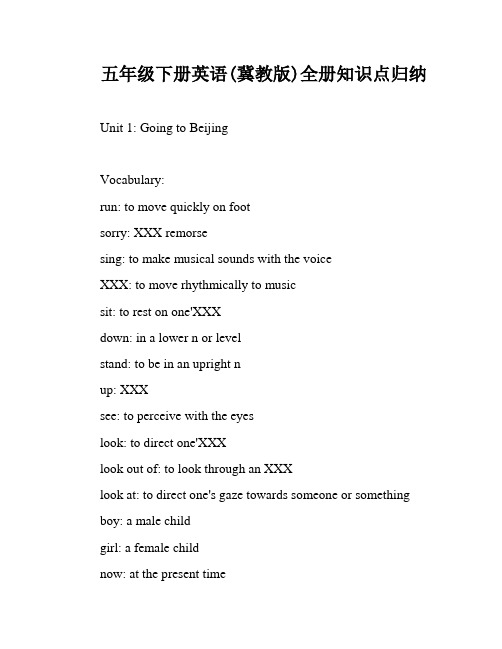
五年级下册英语(冀教版)全册知识点归纳Unit 1: Going to BeijingVocabulary:run: to move quickly on footsorry: XXX remorsesing: to make musical sounds with the voiceXXX: to move rhythmically to musicsit: to rest on one'XXXdown: in a lower n or levelstand: to be in an upright nup: XXXsee: to perceive with the eyeslook: to direct one'XXXlook out of: to look through an XXXlook at: to direct one's gaze towards someone or something boy: a male childgirl: a female childnow: at the present timedraw: to produce a picture or diagram by making lines and markspicture: a painting。
drawing。
or photographXXX: an XXXbaby: a very young childcry: XXX distress or painXXX: to speak in order to convey n or express ideasman: an adult malesleep: to rest with the eyes closed and the body inactivewho: used to ask for n about peoplehungry: XXX the need to eatwater: a colorless。
冀教版(三起)五年级英语下册全册知识点汇总

冀教版(三起)五年级英语下册全册知识点汇总UNIT Going to Beijing一、核心词汇1.和动作相关的单词jump跳;跳跃run跑dance跳舞sing唱;演唱sit坐stand站立;直立look看;瞧see看见;明白;会见(过去式为saw) draw画cry哭;哭泣;喊叫sleep睡觉;入睡talk交谈;讨论2.和食物相关的单词tea茶water水candy糖果3.方位介词down向下;朝下;沿着up向上,在上面4.人物名词man男人woman女人baby婴儿boy男孩girl 女孩5.其他now现在who谁picture图画;照片hungry饥饿的sorry 对不起,不好意思(道歉时用)6.动词短语look at看(某人或某物) look out of从……向外看二、拓展词汇1.其他和食物相关的单词noodles面条dumplings饺子hamburger汉堡包bread面包2.其他常见时间副词yesterday昨天tomorrow明天三、核心句型1.Please don’t run! 请不要跑!解读:此句是祈使句的否定形式,表示不许做某事。
举一反三: Please don’t open the window.It’s cold outside.别开窗户,外面很冷。
Don’t speak in class.课上不要说话。
2.I want to sing! 我想唱歌!解读:此句是表达某人想做某事的句型。
举一反三: I want to visit my grandmother.我想去看望我奶奶。
She wants to go swimming.她想去游泳。
3.— Jenny, what are you doing now?詹妮,你现在正在做什么?— I am drawing a picture.我正在画画。
解读:这是询问某人正在做什么的句型。
举一反三: — What is she doing?她正在做什么?— She is watching TV.她正在看电视。
- 1、下载文档前请自行甄别文档内容的完整性,平台不提供额外的编辑、内容补充、找答案等附加服务。
- 2、"仅部分预览"的文档,不可在线预览部分如存在完整性等问题,可反馈申请退款(可完整预览的文档不适用该条件!)。
- 3、如文档侵犯您的权益,请联系客服反馈,我们会尽快为您处理(人工客服工作时间:9:00-18:30)。
be bfor you …送给你
some photos一些照片
write back回信
very happy非常开心
三会短语
the second day第二天
last year去年
last week上周
this year今年
this week本周
this evening今晚
some fruit一些水果
have fun玩得开心
重
点
句
子
Please don’t sit down .请不要坐下。
Please stand up.请站起来。
I want to jump!我想跳
Jenny is looking out of the window on the train.在火车上詹妮正在向窗外看。
--where the post office?邮局在哪里?
--Go straight. turn left at the traffic lights.直走。在交通信号灯处左转。
I’m writing an email to Steven.我正在给斯蒂文写信。
Don’t forget to write to us.别忘了给我们写信。
feel觉得;感到
tired疲劳的;累的
stop停下,停止(公共汽车、火车)站
afraid害怕,畏惧
for为……,给……
三会
单词
answer回答
arm胳膊
easy简单的
difficult困难的
high高的
hundred百
visit参观,拜访
football足球
table桌子
time时间
thousand千
How much is this postcard?这张明信片多少钱?
I’ll take nine,please.请给我拿9张。
We are having fun in Beijing.我们在北京玩得开心。
--where do you put the address?你把地址放在哪里?
--on the right.在右边。
Don’t be afraid .别害怕。
Jenny buys a scarf for her mother.詹妮为她的妈妈买了一条围巾。
Unit 3 Writing Home
四
会
单
词
much(与how连用以询问数量)多少;很;非常
mum妈妈(非正式用语)
write写
us我们(we的宾格形式)
dad爸爸(非正式用语)
card纸牌,卡片
can会,能
find找到
good-bye再见
Mr.先生
or或者
them他(它,她)们(宾格)
then然后
四
会
短
语
stand up站立,起立
sit down坐下
look at看(某人或某物)
look out of从……向外看
draw a picture画一幅画
talk to…和….交谈
try on试穿
be on试穿
be good for对…有好处
on Sundays在每个周日
重
点
句
子
--Did you have a nice trip?你有一个愉快的旅行吗?
--Yes! I had a great trip!是的!我有一个愉快的旅行!
--What did you do yesterday?昨天你们做了什么?
fine健康的;晴朗的
left左边的;左边
dear亲爱的
right右边的;右边
turn转向;转弯
wrong错误的
email电子邮件
idea想法;主意
computer电脑
use使用;利用
kind有好的;体贴的
三会
单词
Canada加拿大
first第一,首先
home在家,住所
little小的,年幼的
lunch午餐
Danny is not looking out of the window.丹尼没有向窗外看。
--Who is singing?谁正在唱歌?
--The woman behind me is singing.我身后的那位女士在唱歌。
He is talking to the man behind you.他正在跟你身后的那位男士交谈。
far from …离…远
traffic lights交通信号灯
turn left/right向左/右转
go back返回
post office邮局
use the computer用电脑
at the end在末尾
forget to do…忘记做…
remember to do…记得做…
a gift from…一个来自……的礼物
I saw Mr.wood yesterday.我昨天看见了伍德老师。
We were on the train to Beijing.我们在去北京的火车上。
I was sad yesterday.昨天我很伤心。
Please write back soon.请速回信。
We bought gifts for you in Beijing .我们在北京给你们买了礼物。
Ottawa渥太华
o’clock ……点钟
snowy多雪的
tell告诉
put放,安置
四会
短语
write a letter/an email/a postcard to…给…写一封信/一封电子邮件/一张明信片
send…to…给…寄…
a picture of…一张图片
how much多少钱
三
会
短
语
have fun玩得开心
--We walked to Wangfujing Street.我们不行去了王府井大街。
I often watch TV at home.我经常在家看电视。
I watched a film last night.昨天晚上我看了场电影。
The second day,we went to the Palace Museum.第二天,我们去了故宫。
don’t worry别担心
on the way back回来的路上
The Palace Museum故宫
重
点
句
子
They are on their way to the hotel.他们在去宾馆的路上。
There are many people in the park.公园里有许多人。
Some people are taking pictures on the square.一些人正在广场上拍照片。
Well健康,噢
四
会
短
语
many people许多人
some children一些孩子
take apicture拍照
fly a kite放风筝
be afraid害怕
far from…离…远
take a bus乘公交车
too many太多
stand beside Jenny站在詹妮旁边
how long多长
sleep in bed在床上睡觉
put…on…把…放在….上
重
点
句
子
We write a letter on paper.我们在纸上写信
We write an email on a computer.我们在电脑上写电子邮件。
I want to send this postcard to my mum and dad.我想给我的爸爸妈妈寄这张明信片。
四
会
单
词
people人们
many许多的;许多
child孩子(复数形式为children)
busy忙碌的
women女人(woman的复数形式)
wait等待
men(man的复数形式)
say说
help救命;帮助
worry担心;担忧
sad悲伤地
take乘坐;买下;拍照
be是;存在(am,is,are等的原形动词)
baby婴儿
cry哭泣;喊叫
talk交谈;讨论
man男人
sleep睡觉;入睡
hungry饥饿的
who谁
water水
candy糖果
tea茶
run跑
三
会
单
词
me我(I的宾格形式)
Mrs.夫人
very很;非常
okay = OK好,行
ask问;询问
song歌曲
there在哪里;到哪里
some一些
thank致谢
happy快乐的;高兴的
ate吃(eat的过去式)
were是;存在(are的过去式)
bought买(buy的过去式)
back回原处;向后
三会单词
often常常;时常
every每个
second第二
third第三
fourth第四
happen发生
try尝试;努力
class班级;课
party聚会;宴会
open打开
--How old is the palace Museum?故宫有多少年历史?
--It’s about six hundred years old.大约600年。
--How long is it?它多长?
--About 6000 kilometers .大约6000千米。
Danny feels tired and hungry.丹尼感到又累又饿。
